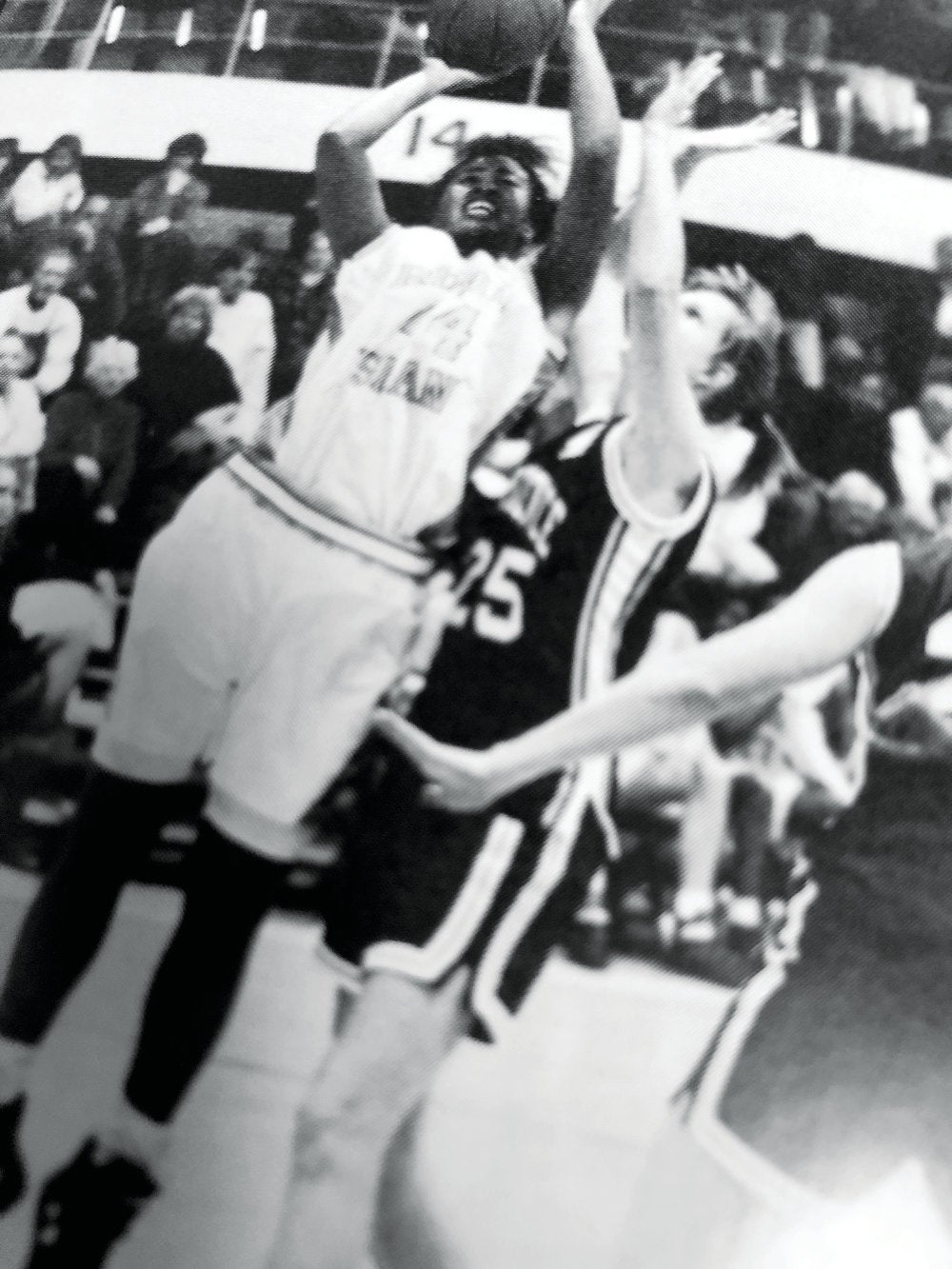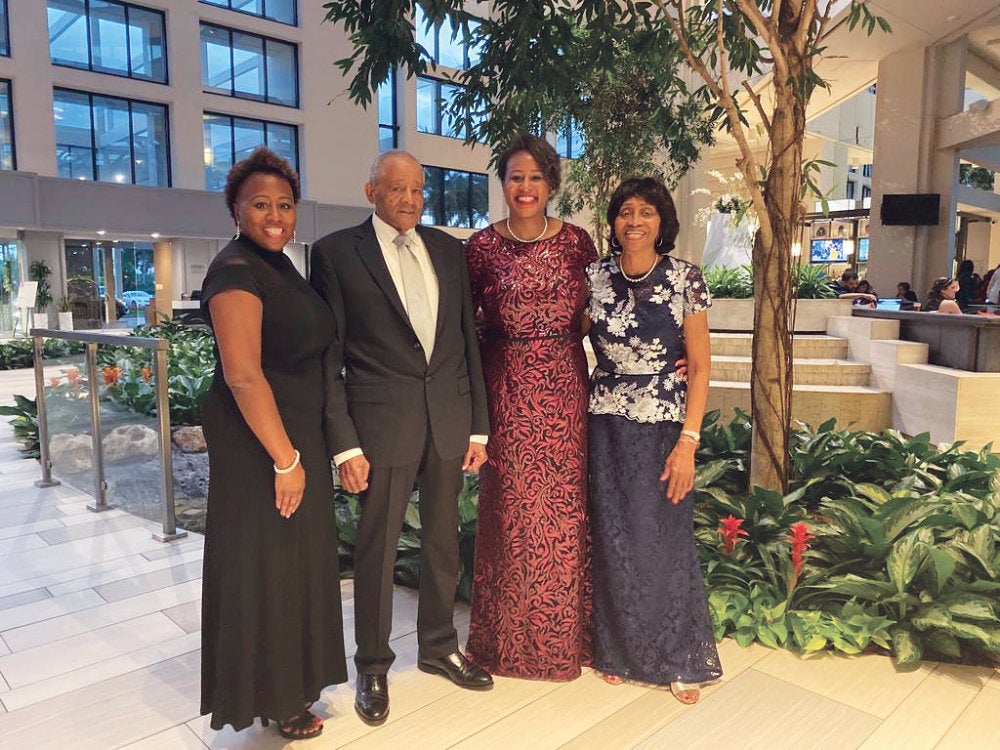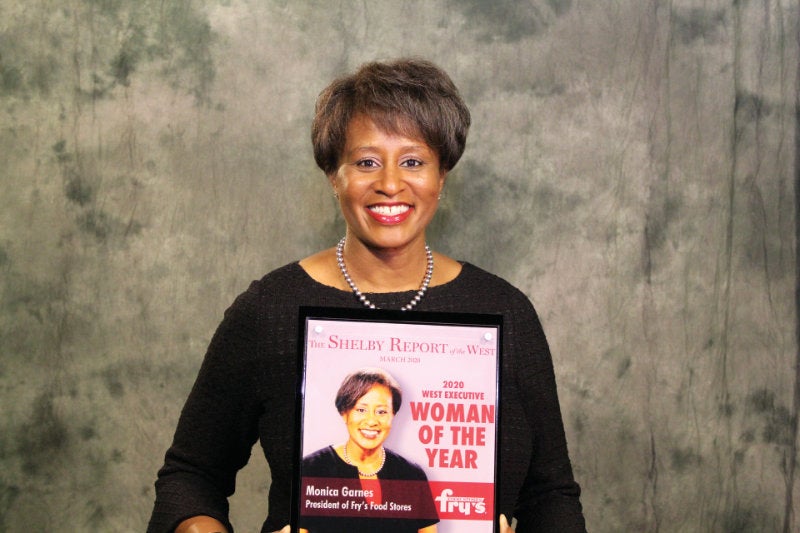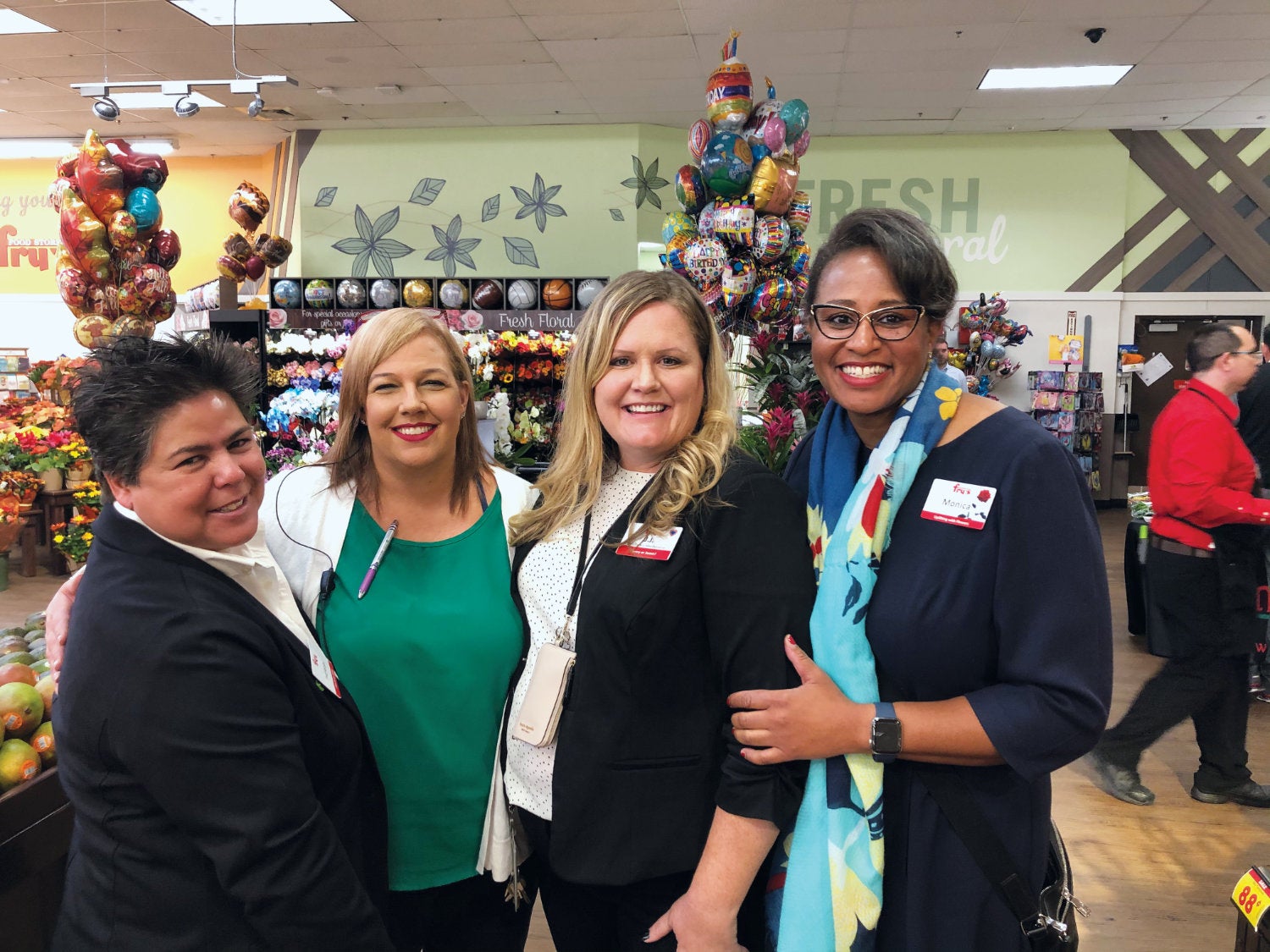She remains one of the top scorers in URI women’s basketball history. But Monica Garnes ’94, president of Fry’s Food Stores, is still earning points for being a team-focused leader who helps others succeed. On the basketball court, in the produce aisle, or as an industry trailblazer, she’s always on top of her game.
By Nicole Maranhas
Start by making the bed. This is advice Monica Garnes ’94 lives by, and she cites a famous speech by U.S. Navy Admiral and former SEAL William McRaven when she considers the power of this simple act. “Making your bed is the first completed task of the day,” says Garnes. “It sets the day on a positive note and starts the ball rolling.”
For sure, the ball has already been rolling for Garnes. As president of Arizona supermarket chain Fry’s Food Stores, she is the first Black division president in parent company Kroger’s history, and an industry trailblazer whose work has been touted by Fortune and Food & Wine. She earned a spot in URI record books while captain of the women’s basketball team, ending her four-year career as one of the University’s all-time top scorers. She could begin any morning with a sense of accomplishment before ever making the bed.
But this is about discipline, pride in your work. It’s taking satisfaction in a crisp corner or a squarely folded sheet. In this way, you create the foundation for whatever happens next.
However you were feeling about your local grocery store before the pandemic hit, you likely felt different by the end of March. So much for the quick stop to pick up a bag of frozen veggies or extra paper towels on the way home, or the mundane hub of overstocked shelves and ‘cleanup in aisle four.’ In a tense, transformed world, something shifted: For many, the supermarket became a sort of lifeline, and its workforce—or the delivery truck carrying pallets of household staples—heroic.

Garnes might be less surprised to find greater meaning in a grocery store. Throughout a diverse range of roles in her 25 years with Kroger—human resources coordinator, public relations manager, district manager, vice president of merchandising—and in her current position as Fry’s president, Garnes has made a career out of seeing connections that others might miss, whether forging a path to work with local farms or taking a hands-on approach to hunger relief. In short, she sees how her work builds community. “When you can find ways to uplift others or give them a sense of connection, it’s a welcome joy,” she says.
It is a career she almost overlooked. In 1994, she was a new URI grad with a degree in business management when she attended a job fair back in her home city of Columbus, Ohio—armed with a stack of resumes and an eye out for something that fit her young vision of professional life: 9 to 5, maybe a skyscraper. She recalls how the representative at the Kroger’s booth needed to flag her down to get her attention. “I was walking around,” she says, “looking at all the other careers that seemed sexier at the time.” Despite her initial indifference, the rep piqued her interest in the company’s management training program. She was hired into the program at the start of the new year—and she found that she felt a connection to the industry, recalling her own family memories of the local Kroger’s as a kid. “I could remember vividly the grocery ads out on the kitchen table, my grandmother with her list, or my parents taking us to a grand opening,” says Garnes. “It was like this natural tie I had almost forgotten.”
Almost immediately, Garnes stood out to higher-ups as a quick-learning talent. Former Kroger president Bruce Lucia, who retired as head of the Atlanta division in 2018 after 44 years with the company, remembers the first time they met. “You could see how people just wanted to work with her,” Lucia says. “She was a confident leader, and she had a great positive energy.”
With Lucia as a mentor, Garnes progressed in her career, leaning into her natural curiosity and her willingness to take on new things. “You have to embrace having the humility to ask questions,” says Garnes. “I always tried to push myself to learn in the hopes people would see I was challenging myself.” Within a few years, her consistent hard work led to a key promotion as assistant produce buyer, but she quickly discovered she was in for a tough road: “I was excited,” she says. “Then one of the store managers said to me, ‘You should have checked with me first. That’s the worst job in the company.’”
The warning proved true. “When you think ‘buyer,’ you think of something fun and exciting, like in fashion,” says Garnes. Instead, she began her days before dawn, taking store inventory by hand—“we were still using notebooks at that time”—and dedicating thankless hours to “cubing out” delivery truckloads, a logistical puzzle of pallet space, freight charges, travel routes, and store demand—not to mention the bananas. “There’s a whole process to bananas,” she says with a laugh. Although she didn’t enjoy the work, she made a pivotal decision to stick it out. “I was trying to find solutions so that when I left, the next person wouldn’t have the worst job in the company,” she says. “I could have thrown my hands up and said, ‘I don’t want to do this,’ but I was able to push through, and it has helped me relate to people who are in those roles today. Even though I couldn’t see the future beyond the daily schedule, I figured out how to be the best I could be to draw from that experience when other opportunities came up.” (When she did move on, it wasn’t before ditching the notebooks and transitioning the department to modern technology.)
“She got great results in every role she had,” says Lucia. Plus, something else: He reflects on her interactions with the other associates, the way she would call others over to recognize their contributions. “You’d see them smile, the sense of pride,” he says. “That’s the trait of a good leader, and Monica understood that right away.”
The sentiment is echoed by Tina Crean, who has worked with Garnes for five years and considers her a mentor. “People gravitate toward her,” Crean says. “She is very present, very calm in stressful situations, and she is there to listen and to support. She gives people the confidence to be their best.”
Once upon a time, Garnes wanted to ride a bike. She still had training wheels, and she remembers watching her older siblings, Brian and Myra, riding their own bicycles around the neighborhood when it struck her that there was only one way to learn. The training wheels had to go. “It took trial and error, falling down and getting back up,” says Garnes. “But later that day, I was riding my bike.”

It’s a simple memory that speaks to her lifelong zest for a good challenge, an inner confidence she attributes to a background in sports and growing up as the youngest of three, in a tightly knit family that shares her best memories: picnics, road trips, afternoons in the park playing softball and tennis. Her parents emphasized education, making sacrifices to send all three kids to parochial school, which she credits for the values that have shaped her life. “I grew up in a culture of ‘do unto others,’” she says. “That combination of a strong education and my amazing parents, the way they showed up for us and for each other, set an example for who I am and what I expect from myself.”
Garnes loved music—she played clarinet, first chair, up to the high school marching band—but in fourth grade she discovered basketball in the footsteps of her sister, Myra. Garnes played other sports, volleyball and softball and later cross-country, but she was a basketball standout. By freshman year of high school, she found herself in an unusual spot, pulled in dual directions by the freshman and varsity teams.
“We were lobbying for her to play on the varsity team,” says Myra. “There were politics about whether a freshman could play varsity, but we needed her.” Despite pushback from some players and their parents—and a freshman coach who wasn’t eager to give up her star—it was eventually agreed that Garnes could play two quarters for each team. Myra remembers when her little sister took the varsity court for the first time. “I don’t remember how many points and rebounds she got, running around the court, smiling,” Myra says. “Monica sometimes has an unassuming personality, but she’s very serious about making sure the people around her are successful.” Within a few games, Garnes was a starter on the varsity team. (She is averse to gloating. “I figured my skills would speak for themselves,” she says. “But I didn’t go in with the attitude of ‘I’m the best.’ I knew I had plenty to learn, and I wanted to help.”)
URI was an easy sell for the high school recruit. “When I went to visit the campus on my college tours, it just felt meant to be,” Garnes says. “It was my first time on the East Coast, and it was so beautiful, and I felt a great connection to the team.”
Former URI teammate Monica Williams ’95 remembers how easily Garnes, by sophomore year, took incoming freshmen like Williams under her wing. “She was a leader even before she became captain [in her junior year], setting the parameters of expectation—workouts, being on time,” Williams says. “She did it in a way that brought people together.”

Those years on the team proved valuable training ground, not only in balancing the competing demands of classes and basketball, but in embracing challenges, or the small victories, as they came. “We were so often playing against girls who were bigger and taller, and that takes a certain level of strength and determination,” says Williams. “We lost a lot of games, but it’s a testament to your character if you can keep playing and getting better. Monica helped us to understand that.”
The Rams may have been in rebuilding mode back then, but they finished the team’s first winning season in nine years during Garnes’s senior year. She ended her basketball career with 1,160 points and 877 rebounds, making her a member of the University’s elite 1,000-point club and earning her a spot as one of its top four rebounders of all time, alongside URI Hall of Famers Michele Washington ’86, Naomi Graves ’82, and Ellen Quantmeyer ’86. (This spring, graduating senior Nicole Jorgensen became fifth on that list.)
“When I see my name in the record books, it’s the culmination of years of support from my family, my friends, coaches, and teammates since the fourth grade,” says Garnes. “I’m proud to be among so many great women.”
How to lead in a crisis: Live your values. This is a daily credo—“I try to show up as Monica every day”—that guides her work, particularly in cultivating an environment where everyone feels heard and counted, in the workplace and beyond. “When I think of how grocery stores are at the center of communities, I think about how we can give people a sense of connection to each other,” she says. Among recent initiatives, Fry’s has provided drive-through COVID-19 testing and supported hunger-relief efforts through Kroger’s Zero Hunger | Zero Waste Foundation. But Garnes has also made hunger a personal mission, bringing teams from Fry’s to pack emergency food boxes for local families in need.
“She walks the walk,” says Tom Kertis, president and CEO of St. Mary’s Food Bank Alliance, one of the largest food banks in the United States, which partners with Fry’s. “She demonstrates that she’s willing to do what it takes to help. I’ve not seen other leaders at her level do that.”

Outside of work, she does find time for herself. She cooks and travels. She plays golf, taking after her dad, a longtime golfer. She remains a dedicated basketball fan, keeping in touch with her URI teammates by group chats or meet-ups at the Women’s Final Four. But community is always close to her heart: She serves on the board for the Phoenix Suns Charities, is dedicated to giving back to URI, and volunteers with a local school, taking groups of elementary kids to nearby hiking trails via public transit—exposing them to the outdoors and exercise, but also demystifying the light rail system. “I want them to grow up seeing that there’s nothing to keep them from going the places they want to go,” she says.
She is living proof. Among numerous industry accolades, she was honored in 2016 as one of Fortune and Food & Wine’s “Most Innovative Women in Food and Drink,” in recognition of her work to build collaborations between Kroger and local farms, not to mention her name on various lists of Arizona’s most outstanding and influential women in business. In 2018, she became the first Black division president in Kroger’s then-135 years of history, adding to a long line of firsts she has experienced both as a woman and a woman of color. “It’s a very humbling honor to be considered a trailblazer, but my hope is that in ten years there won’t be these firsts,” she says. “One thing I love about my role is that it gives women and people of color an opportunity to see themselves in roles they’ve never dreamed of. I take that responsibility seriously to make sure I am available for mentoring and answering questions.”
The desire to open doors for others is in her DNA. Her sister Myra tells the story of a childhood family reunion in Alabama, where the kids—dressed in their matching yellow reunion outfits—stood at the edge of a sandpit, looking down the steep sides, but afraid to jump. “Monica was always the first for adventure,” Myra says, recalling how her sister charged down the slope, and the others followed suit. “We’d take swimming lessons together, and I’d stand at the side of the pool, afraid, and she would be shouting, ‘Come on, you can do it! Let’s go to the high dive!’ I’ve always admired that about her. She is fearless.”
Garnes will tell it differently, of course, that it was those around her—family, friends, mentors, teammates, and colleagues—who have given her courage. She lives by a Jane Howard quote: “Call it a clan, call it a network, call it a tribe, call it a family. Whatever you call it, whoever you are, you need one.”
“I stand on the shoulders of an amazing support system and so many people who believed in me,” Garnes says. “It has made the difference in my life.”
Perhaps it comes down to this for Garnes. There are two ways to be a champion. You can stand among the greats, with your name in the record books. But you can also use your voice—on the basketball court, every day at work, in the community, even as a kid at the edge of a sandpit or a swimming pool—to be a champion for others. •
Photos courtesy URI Athletics and Monica Garnes
